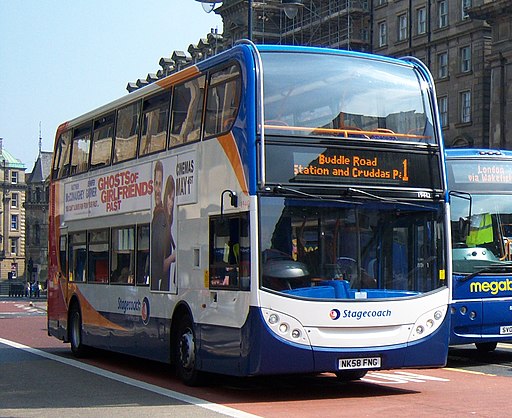Bus services in Tyne and Wear are to be controlled by the council as
Councillors have backed plans for regulated services under the Quality
Contracts Scheme.
In a move which could signal the biggest changes to the way buses operate across the region since de-regulation in the 1980s, members of the North East Combined Authority (neca) have today agreed to submit proposals for the introduction of a Quality Contracts Scheme (QCS) for consideration by a special independent panel.
The north east is the first part of the country to reach this stage in developing a Quality Contracts Scheme under legislation introduced in 2000. The new scheme would see bus companies contracted to provide routes by Nexus on behalf of the North East Combined Authority, rather than the bus operators deciding which services to run on the basis of market forces.
Local authorities currently use their powers to supplement the network by subsidising routes which would not be commercially viable for bus operators. Under the Quality Contracts Scheme operators would provide services on a range of routes to a contractually agreed price.
The proposed scheme would allow neca to re-invest part of the profit buses make in Tyne and Wear to improve local services, support the local economy and cater for local people’s needs.
The QCS would apply to Tyne & Wear and to services which cross into Northumberland and County Durham. Leaders also agreed a protocol to avoid any adverse impacts on other services in Northumberland and County Durham.
Bus operators proposed an alternative Voluntary Partnership Agreement which would see bus companies working together with the Combined Authority to provide a co-ordinated service under a formal voluntary agreement.
Councillor Nick Forbes, (leader of Newcastle City Council and) Regional Transport lead for the North East Combined Authority said: “After a lengthy and careful consideration of the Quality Contracts Scheme proposal, and the Voluntary Partnership Agreement, the Leadership Board felt that the QCS scheme to be in the best interests of bus users in the region.
“The proposal presents the best option for increasing passenger numbers, protecting important but less profitable bus routes, preserving concessionary fares and providing a clear and easier to use bus network for passengers.
“We believe it is a very sound proposal and we await the decision of the independent Quality Contracts Board with great interest.
“We realise that the bus companies will find this decision disappointing. But leaders took their decision balancing the wider public interest and concluded that the voluntary arrangements proposed by the bus companies could simply not deliver our ambitions for better bus services. We were also clear that, without action, bus use would continue to decline, and the pressures on public funding would simply become unsustainable.”
The proposal will now be submitted to the independent Quality Contracts Board convened by the Traffic Commissioner, which will consider whether the proposal is in the public interest. Its decision will then be referred back to the North East Combined Authority for a final decision. If agreed the aim would be to introduce the Quality Contracts Scheme by April 2017.
Statement from North East Combined Authority
This would also be bad news for the private bus operating companies as they
would lose their profits.
The proposed quality contract scheme could significantly reduce the profits of Stagecoach, Go-Ahead and Arriva.
Under the scheme, bus operators would have to bid to win contracts and their profits, currently totalling £20m a year in Tyne and Wear, would be cut to £12m, according to Nexus, the area’s transport executive.
It meant that Stagecoach, Go-Ahead and Arriva could lose £81m in profits over 10 years if they won the new contracts, Nexus said. Alternatively, if they did not win any contracts, they risked forsaking £187m in profits, Nexus added.
The scheme would also see the existing £65m a year of public subsidy for Tyne and Wear bus services cut by £5m.
Phil Medlicott, managing director of Stagecoach’s northeast operations – whose parent company has previously threatened legal action to fight it – questioned the councils’ expertise and the scale of financial risk. “Bus services aren’t meant to be run by local authorities,” he said.
From Financial Times
If they do regulate the bus services then I think we will see hybrid buses
operating in conjunction with electric buses. They should also add branding to
the buses that operate the regulated routes so that passengers would know that
the bus is operated by the council. Also, I believe that the private operators
will need a permit which would be similar to the concept of the 'London Service
Permit' in order to operate their own route in the regulated areas.
I am all in favour of locally owned bus companies because they benefit the
local people by being locally owned. The regulated services could easily be
changed though, such as converting the route from single deck to double deck
buses, increasing the frequency, and having a smartcard system which TFL currently
have. However, privately owned operators
such as First Group, Stagecoach, Arriva, Go Ahead and various other companies
will have to invest in a smartcard system though, but it would only be on a
'single operator'; to have it 'multi-operator ' the company would need
subsidising from the local authority.
If the smartcard system becomes popular and the council run bus service
introduces the contactless bank card, then we would see another region in
Britain having cash free buses.
What does the reader think of these proposals? If you think regulated bus
services are good for the people of Tyne and Wear or that they are bad for the
bus operating companies, feel free to post your opinion in the comment section
below.
Also, don’t forget to follow me on Twitter, which is @CLondoner92


